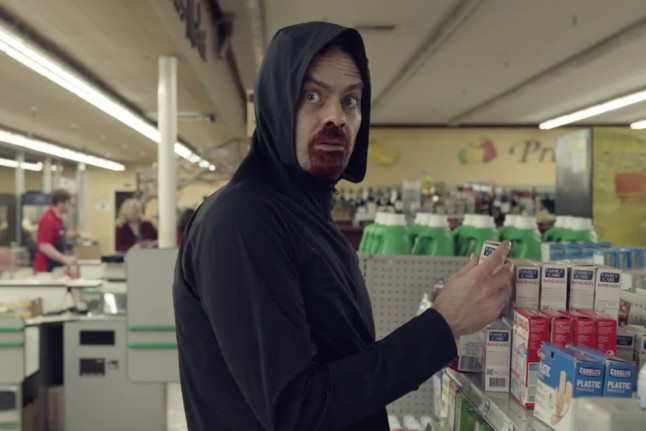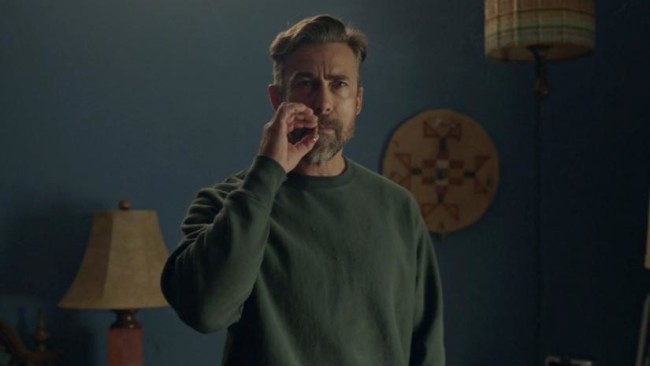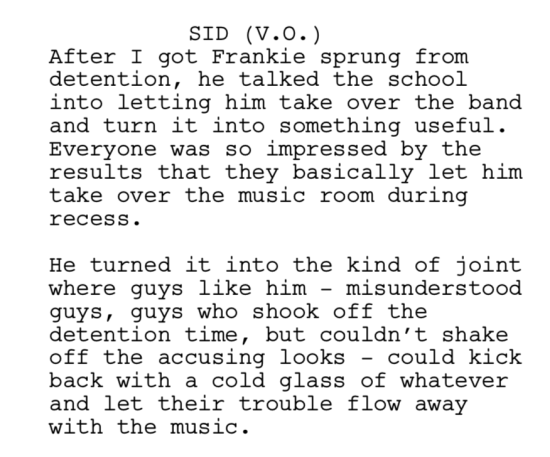Genre: Drama/Psychological Thriller
Premise: Based on a real life story, the psychotic father of a freshman at a small college moves into her apartment and begins controlling the lives of the 6 other coeds who live there.
About: This is a high-profile “New York” magazine article that got picked up by Hollywood heavyweights Jason Blum and Mark Wahlberg. They haven’t decided whether to turn it into a TV show or a movie yet. Though if they go the movie route, Wahlberg will play the baddie, Larry. This is pretty shocking, as Larry will be one of the most reprehensible characters ever put on screen. I guess Wahlberg is going for that Oscar. But it’ll come at a price as he’ll temporarily lose his 4th of July Middle America family hero image.
Writers: Ezra Marcs and James D. Walsh.
Details: 5000-7500 word article
If you break into this business, there’s a good chance it will be through a Jason Blumhouse production. He’s the guy who specializes in high concept low-budget fare, which is what you should be writing if you want to break in. Therefore, you should always be tracking what Blum is up to. Understanding his taste could be the difference between a writing career and a bartending gig.
Talia Ray is in her first year at liberal arts college, Sarah Lawrence, living with a group of coeds, when she informs them that her father is getting out of prison and needs a place to stay. She assures them that he had “been framed” and was a great guy. As it turns out, Talia was telling the truth. The 50 year old Larry Ray was a quirky but energetic guy who liked to tell tales about his time in the military and CIA.
At first, Larry played the part of dorm dad, laying down a schedule, paying for meals, helping the students study. But then he began holding group therapy sessions at the end of the day, all of which ended, oddly, with Larry convincing one of the students that they were sexually abused as a child.
Things got weird when Larry started sleeping in the same room as one of the students, Isabella. And when another student, Daniel, started dating Isabella, he would instruct them to have sex in front of him under the guise that he could help them achieve a higher sense of clarity (or something). Daniel thought something about Larry was off. But since everyone else in the dorm seemed to think he was great, he figured he, Daniel, must be the problem.
How Larry ended up in prison is hard to sort out because Larry’s so good at lying. Everything he claims has a sliver of truth to it so if you look into it, there’s no proof that it’s definitively a lie. For example, Larry claims to know Robert DeNiro. And Robert DeNiro does actually say he met Larry once. Most of his connections date back to knowing one of Rudy Giuliani’s right hand men, a powerful contact in the years directly after 9/11. But Larry ended up selling him out, which resulted in a revenge mission that put Larry behind bars (according to him).
Things get truly devious when we learn how Larry makes money. In one of the most bizarre schemes I’ve ever heard of, Larry tells people that they “broke” items of his, makes them admit it in written form, and forces them to pay him back. Some of these items, like a window, could go for a couple hundred bucks. But other times he claims his entire house was destroyed and demands half a million dollars. In one of the saddest examples of this guy’s insanity, one of the girls, desperate to pay him back, began working as a high class escort after she graduated. Charging $8000 an evening, all of the proceeds went to Larry.
So how do you get away with all this? As is typical with these psychopaths, they use intimidation, manipulation, and threats to keep their victims in line, and they never do anything they know can put them in prison. They don’t kill anyone. They don’t rape anyone. In every case, the victim makes the decisions. Some of these people have actually escaped Larry’s clutches, and he’s still out there hunting them down, trying to get the money he’s “owed” back. Larry denies any of this happened, of course, and says that it’s actually himself who’s the victim. That Giuliani’s old aid is trying to kill him.
This reminds me a lot of the true life podcast “Dirty John” (which would eventually be made into a TV show). But even though the titular character in that story would end up trying to murder someone, I feel like Larry is worse. This guy is pure evil in every way. He manipulates. He cons you out of money. If you try to run away, he threatens you. And if anybody calls him on it, he claims he’s the victim. He’s literally the worst type of human being you can be.
Which is our first screenwriting lesson of the day. Remember that when you’re conceiving of an idea, you’re looking for something that makes the audience FEEL SOMETHING. If they don’t feel anything, your story is a failure. Now the more popular movies like to make you feel good. Or scared. Or they might make you feel sad-happy in that cathartic “I’ll never let you go Jack” way. But one of the overlooked ways to make an audience feel is through anger.
You saw this, for example, in the documentary, Three Identical Strangers. With each new revelation, we became angrier and angrier. The reason you don’t see this used as much is because people don’t like to go to the movies to be angry. They go to the movies to escape negative emotions. So it’s a risky choice. What you’re hoping for is that the audience (or reader) gets SO riled up, that they have to talk to other people about it. And those people will then have to see it for themselves. I feel like Larry is powerful enough to achieve that.
I can also see why, out of the millions of articles on the internet, Blumhouse chose this one. You get to tell the story of a cult but the story is already localized for you. What does “localized” mean? Well, one of the challenges of writing about a big event is figuring out what you’re going to zoom in on. For example, if you’re telling a story about the apocalypse, you can’t cover every country and every city and every person and the military and the government and etc. etc. You need to find a small group of people you’re going to follow. “The Stolen Kids of Sarah Lawrence”allows you to tell a story about a cult, but it’s all happening in this tiny dorm room. It’s already localized.
On top of this, “Sarah Lawrence” has a second thread working underneath it, one that’s fascinated people for as long as cults have been around. That being, “How can they be so stupid?” A couple of the girls who come into this story graduated from Harvard and Columbia. And Larry’s got them in a three-way sexual relationship. The fact that nobody can ever satisfactorily answer that question is why cults will always be fascinating. For what it’s worth, I think falling victim to a cult is a combination of things. One, these are often people who feel lost. And when people are lost, it’s easier to spin them a tale. Second, I think being in a cult is a bit like falling for the wrong person. By that I mean someone who’s cruel to you. Someone who takes advantage of you. Someone who psychologically manipulates you. But when you’re in love, you can’t see these things. Your best friend could literally lay out all of the ways this person is terrible to you, and you can’t see what they’re saying. I imagine cults working on a similar level. At least, that’s the only way I can make sense of it.
I could see this being a good TV series. Tell the story through the kids’ point of view and focus on them wanting to get out but not being able to. Cause if you tell the story the way it’s told in this article – that nobody wanted out until the very end – it will be infuriating. We have to have one or two people trying to get away and expose this man.
[ ] What the hell did I just read?
[ ] wasn’t for me
[x] worth the read
[ ] impressive
[ ] genius
What I learned: The “Liar Liar Pants on Fire” sub-genre. Hollywood loves stories about liars. We just had a prominent Oscar contender liar with Can You Ever Forgive Me. If you can find a true-life story about a liar who got into some deep sh*t because of his lies, consider writing that puppy.
The Scriptshadow Newsletter should be hitting your Inboxes any second now.
I give more screenwriting tips in this Newsletter than any newsletter in history! For all you TV writers, you’re going to love this edition. Lots of TV stuff. I give my opinion on Rotten Tomatoes’ stupid new review policy, that Terminator trailer, the weirdest video game trailer I’ve ever seen, a big new spec sale, and a great big sci-fi spec review.
If you don’t receive the newsletter within the next hour, make sure to check your SPAM and PROMOTIONS folders in your e-mail program. If you can’t find it there, e-mail me at carsonreeves1@gmail.com with the subject line, “NEWSLETTER!” and I’ll send it to you. Enjoy!
p.s. For those of you e-mailing me saying that you keep signing up but don’t receive the newsletter, try sending me another e-mail address. E-mailing programs are notoriously quirky and there may be several invisible reasons your e-mail address/server is rejecting the e-mail.
Genre: Thriller
Premise: A film school dropout with a talent for producing AI-generated “deepfake” videos is caught in a global conspiracy when he receives a disturbing commission from a mysterious online stranger.
Why You Should Read: If you haven’t yet seen deepfakes in the news, you will. This emerging AI-powered technology lets anyone with an average gaming PC churn out eerily lifelike fake videos of people. The social and political implications of this technology are huge, and it has politicians, generals, artists, and celebrities freaking out. Someone is going to make a movie about deepfakes. I hope it’s this one, and I think my background in tech makes for a story that’s plausible and well-researched while still being thrilling, unpredictable, and character-driven.
Writer: Alex Payne
Details: 115 pages
I’ve always said that the only original stories left to tell are the ones that incorporate new technology. I mean, do you really think you’re going to find some new angle on the zombie genre? Or the romantic comedy? Or an action-adventure? Or biopic? People have been telling these stories for decades – arguably centuries. Which means high-profile technology that nobody expected to exist (because if it did, it would’ve already been written about) is the last opportunity to write something fresh (incidentally, this is why “voice” is valued so highly in the industry. With every story already being told, the only way to make a story stand out is via the unique way in which its told). However, just because you’re writing about something new doesn’t mean you can’t descend into tired storytelling tropes. That’s what I’m always worried about when I see a script like this. Is the flashy subject matter a smokescreen for what’s going to be a traditional thriller? I hope not!
22 year old Mo James is essentially squatting in a New York City apartment, promising his friend of a friend landlord that he knows he’s missed the rent the last three months but he promises he’ll have the money soon. Mo’s not the only one in his family having money problems. His once successful father is about to lose his home and business if he doesn’t come into some dough fast.
Mo heads to the dark web hoping to find a job that will pay for all this. Oh yeah, Mo is a deep faker. He takes home porno videos and fits celebrity heads on the girls’ bodies. There ain’t enough money in it for a New York City lifestyle, though, so Mo is desperate to find something that pays more. That’s when he comes across a 1.3 million dollar deep fake job. He thinks it’s fake, but after a little research, he learns the client is legit.
Mo accepts the job but when he receives the video, he realizes why it pays so much. In it, a militant Asian woman is speaking to an entire crowd of people, trying to rile them up. Mo’s job is to deepfake every single face in the crowd! There’s no way he’s going to be able to pull this off by himself, so he contacts his sister who has a relationship with a high profile transgendered hacker named Darby. Darby thinks what Mo does for a living is disgusting but decides to help him anyway.
As Darby tries to solve the mass-deepfaking algorithm, he becomes curious who hired Mo and suggests they find out. This leads the two on a wild goose chase around town as they track down remote computer servers connected to other remote computer servers that connect back to where the client actually lives. Of course, when the client finds out that they’re snooping, they try to kill Mo and Darby. It will now be up to them to expose the bad guys before they perish under mysterious circumstances.
I can see why this script won Amateur Showdown last week.
It has a really strong first 10 pages, which is what most voters base their vote on. If I would’ve read the first 10, I would’ve voted on Deepfake as well. What’s most impressive is the knowledge the writer has, not just in regards to this subject matter, but with computers in general.
However, little red flags began popping up that the strong start would be temporary. And I want to make clear that I’m not out there actively searching for these flags. They pop up subconsciously. I’ve read so many scripts at this point and have become so aware of patterns that when they happen, a natural, “uh oh, I’ve been here before” warning pops into my brain, like a low altitude warning on a jetliner.
The first flag is that everybody in this script is 23 years old (or 21, or 22, or 24). Why is this a flag? Because, in my experience, it means that’s how old the writer is. And while 23 year old writers can be extremely talented, they haven’t failed through enough screenplay experiences yet to truly understand what works and what doesn’t. More specially, they’re weak with structure and struggle mightily with second acts.
On top of this, while their voice can be exceptional, they often don’t have the life experience to convincingly portray grown-uphood. And this won’t matter as much if you’re writing, say, a romantic comedy about two 23 year olds. But when you’re bringing in giant organizations and global firms and military stuff and the real job world, a lot of young writers don’t know that world well, which results in them, well, ’deepfaking’ them (using approximations based on previous movies and TV shows they’ve seen). You can feel that as a reader. It’s no different than George Lucas writing about love. Him not knowing that world is why we get Anakin and Padme rolling around in waterfalls in Attack of the Clones.
Indeed, those are the two main problems here. On the structural front, the second act gets messier and messier. It feels like the characters are running around with their heads cut off. It feels like the story is running around with its head cut off. It feels like the writer is struggling to keep this thing on the rails. Half the time, I didn’t even know what Mo and Darby were trying to do! It seemed like they wanted to find out who the client was, but all I kept thinking was, “Why??” Cause they’re curious? Should 50 pages of a script be driven by two characters’ curiosity?
And then there was the video itself. The writer never gave us a convincing reason to care about this militant woman talking to a group of admirers. In fact, I still don’t know what the point of deepfaking the crowd was. In the end, the video’s lack of substance was confirmed when we were told it was some random terrorist in some random part of the world attempting to do some vague “bad” thing. Here’s a question writers need to ask more often. Why should we care? Why in the world do I, the reader, care that some fringe terrorist group is going to do some fringe terrorist act 10,000 miles away from my existence? Change number one for this script needs to be to tie it in to where our characters are actually located. The terrorist act needs to affect New York.
I hate to pile on, but every 10 pages was worse than the previous 10 pages. And that happens A LOT(!!!) with young writers. They nail the first act and then they give what they feel is a decent exploration of the idea going forward. DECENT ISN’T GOOD ENOUGH. Let me give you an example. Late in the script, Darby and Mo get into a fight about Mo’s deepfaking job, specifically the fact that he’s taking these girls and putting celebrity heads on them. “Do you get their consent!?” he hells at Mo. “Do you get their consent!?” It’s not that Darby’s concerns aren’t valid. But this isn’t what the story is about!!! It wasn’t about how Mo deepfaked an innocent girl and the rest of the movie is the fallout from that situation. They’re battling an organization that sends out drones that fire missiles at them! Who cares about the moral consequences of what Mo does at this point? You have to understand your theme and what you’re actually trying to say when you’re writing scenes like this. Otherwise, it feels like a grab bag of drama, a writer desperately looking for any conflict he can latch onto.
Personally, I think Alex approached this story from the wrong angle. Late in the script, Mo threatens to frame a journalist he dislikes by deepfaking their face onto an incriminating video. “That’s not me,” the journalist says. “I’ll prove it’s fake. I’m a reporter. People trust us.” That should’ve been your theme. Fake news. Journalists using this deepfake technology to back up their own narratives. Have a journalist hire Mo to deepfake a video that ends up going viral and changing the political landscape of the country. Sort of like the next step up from what Louis Bloom was doing in Nightcrawler. I don’t see how anyone’s going to get excited about a deepfake story that’s centered around an unknown province in India.
Script link: Deepfake
[ ] What the hell did I just read?
[x] wasn’t for me
[ ] worth the read
[ ] impressive
[ ] genius
What I learned: Last Second Villain Syndrome never works – We literally meet our villain in the final scene of the script. Come on! You either have to introduce the villain earlier or one of your good characters has to turn.
What I learned 2: Make things hard for your hero. Not easy. Especially when it comes to stakes. Mo’s landlord is a friend of a friend who’s SUPER understanding that Mo is late with his rent. That’s not interesting at all. Make it someone Mo doesn’t know. Make him scarier. And make him demand money now, not whenever it’s convenient.
Is Barry Season 2, Episode 5 (“Ronnie/Lily”) really the best episode of television since 2010? I don’t know. But it’s in the conversation. I resisted discussing the episode until now because I figured only a small percentage of you watched Barry and to best appreciate the episode, you needed to watch the first 8 episodes of Season 1, and the four preceding episodes of Season 2. Did I really expect all of you to do that? No. But then I realized Ronnie/Lily is basically a standalone episode. As long as you understand Barry’s character and past, you can enjoy it.
Barry is a former hitman who’s moved to LA and joined an acting class. The problem is, he keeps getting pulled back in to do jobs, despite the fact that he desperately hates killing people. Due to a string of circumstances, Barry is “hired” to kill a guy who’s sleeping with another man’s wife. But Barry’s got a plan. He’s going to show up at the man’s house, he’s going to explain the situation, and he’s going to help the guy disappear so that they both get what they want. As Barry is helping the man pack, they walk into a giant trophy room. It turns out this guy is a freaking Taekwondo master. Barry’s a little freaked out by this, but they continue to pack. Then, just when Barry lets his guard down, the guy attacks. A long drag-down fight ensues.
It’s best if you actually watch the episode. But if you don’t have time, here’s what happens. Barry somehow manages to defeat the guy, who dies. But as Barry’s leaving, the front door opens and an 11 year old girl in a karate outfit appears. The two freeze, both look at each other, and the girl darts past Barry. Barry heads to the door, opens it, is about to leave, stops, closes the door. Oh no! We know that Barry now has to kill the daughter as well! So Barry goes searching through the house to find the girl when… she appears out of nowhere and attacks him. The girl is like a feral Taekwondo monster. She’s relentless, diving and scraping and biting and growling as she attacks Barry from every angle. Barry does everything he can to stay alive before the girl darts out the window and disappears into the neighborhood.
Barry goes back to his handler, Fuches, who’s waiting in the car. Fuches asks if he took care of business. Barry tells him about the girl. Fuches says, “Well she’s seen you. We gotta kill her.” The two go driving through the neighborhood until they come across her again. But instead of attacking her, she attacks them! The girl’s moves are almost inhuman and the guys don’t understand what they’re dealing with. That’s the gist of the episode and I won’t ruin the ending. But let’s just say it continues to unfold in an unexpected entertaining way.
If that sounds too bizarre to be good, I promise you this. They make it work. You can complain all you want in the comments about, “WHAT??? A LITTLE GIRL ATTACKS A GROWN MAN AND SHE LIVES???” or whatever other complaint you have based on my synopsis. It’s pointless. The only way to understand the genius of this episode is to watch it. Cause they take a lot of things that shouldn’t have worked and they not only make them work, they combine the ingredients into an all-time classic meal. You gotta understand how hard that is. The show that precedes this one HAS DRAGONS in it. It has zombie monsters. It has production value that rivals most 1960s war epics. Barry has people. That’s it! It reminds me how powerful a single writer with a few characters and a room can be. With that in mind, here are 7 screenwriting lessons to learn from Barry, Season 2, Episode 5.
1) Chase down weird unexpected ideas – The only reason this episode exists is because the stunt coordinator on Barry told Bill Hader (the co-creator and actor who plays Barry) after a long day that he knew of this young girl who was a karate master and if Bill ever had a story idea that included a young karate girl, he thought this girl was talented and would kill it. Hader says he then wrote down the idea of Barry getting into a fight with this girl. Later, when they were writing Season 2, he decided to make that the centerpiece of an episode. What’s important to note here is that Bill didn’t just come up with this idea. A person suggested it to him, which got him wondering if a character like that would work on Barry. This makes me wonder how many great ideas I’ve missed over the years because a random person didn’t come up to me and drop a bizarre idea. So my tip here is, instead of waiting for this to happen to you, be the person who suggests weird ideas yourself. At the beginning of the day’s writing session, suggest five weird ides to yourself and chase those ideas down to see if anything interesting comes of them. They very well may yield nothing. But if there’s a chance that one of them will lead to a creative explosion and something even half as good as Ronnie/Lily, it’s worth a try.
2) Look for components in a scene that you can play against type – When you imagine a scenario where a hitman comes into a guy’s house and tells him he’s here to kill him, you’re thinking the house owner is probably freaking out. He’s probably talking a mile a minute. He’s nervous and scared and jumpy. That’s how most writers would write this scene. The father character in this scene is the complete opposite. He has no reaction whatsoever. He’s as calm as calm can be. Playing this character against type creates a slow unnerving subtext to the scene. Because he’s being so non-reactive, we know something is up with him.
3) What’s the worst thing you can do your character in this moment? – This is the question Bill Hader asked when Barry showed up at this guy’s house. He thought, “What if, as they’re packing, they walk into a room, and it’s filled with Taekwondo trophies?” It’s a brilliant moment as it completely shifts the dynamics of the scene. A second ago this was just a guy. Now he’s a man capable of killing you with his hands. Always ask what the worst thing is you can do to your character in this moment. You won’t always use it. But it’s a quick way to find a great scene.
4) Once you open a line of suspense, let it ride – Remember that with suspense, you can add an insane amount of tension to a scene even during periods where little is going on. Too often I see writers create a suspenseful situation then ruin it by immediately jumping to the action. Here, when they walk in the Taekwondo room, Bill Hader has opened a captivating line of suspense. This is not an ordinary man. He’s a dangerous adversary. But Hader doesn’t jump the gun. He allows the man to slowly pack, to slowly walk back into the other room, and to continue packing. This is one of the most powerful sections of the episode even though, technically, nothing is happening. Let those lines of suspense ride!
5) Ground your episode with an emotional anchor – When co-creator Alec Berg read Bill Hader’s script for Ronnie/Lily, he had one note. Ground it in emotion so it’s not just this big wacky fight episode. In the show, Barry has a complicated relationship with his handler, Fuches. The man saved him when he was at his worst, but then turned him into a contract killer, a life Barry’s trying to leave. Hader decided to give us a little more on their relationship, so there are a series of flashbacks (never too long) of Fuches rescuing Barry from his tour in Iraq, and he ties those in with the present scenes of Fuches helping Barry find this girl. It’s a surprisingly emotional payoff, and a huge shift in their relationship going forward.
6) Don’t always start the scene on the obvious character – In Hader’s first draft of the episode, we follow Barry into the house all the way until he confronts the father. One of the writers suggested that this was boring. Instead, start by following the father instead. It was a game-changing choice because it resulted in us watching this random guy drive up to this random house, go inside, put his stuff away, and the whole time we’re thinking, “Who is this guy???” It totally changed the dynamic of the scene, where only later does Barry come in. Even then, we don’t see Barry. We only hear him off-screen. Nothing about this episode plays out the way traditional TV does. The DP even challenged Hader on this moment. “Why are we only hearing Barry? It doesn’t make sense.” “I don’t know, it just feels right,” Hader answered. And he was dead right. Way more interesting.
7) Add complications to fight scenes so they’re not like every other fight scene we’ve seen – One of the conscious choices Bill Hader and Alec Berg made early on about the Taekwondo dad fight was that it was going to be realistic. It wasn’t going to be perfectly choreographed. It was going to be messy to look at and the guys were going to be tired. They’d take breaks. More specifically, Barry gets an early hit on the guy’s windpipe, damaging it to the point where the guy is barely able to breathe. That wheezing breath becomes a centerpiece of the fight, helping to differentiate it from all the other onscreen fights we’ve seen. It was like the anti-John Wick and extremely refreshing.
Ronnie/Lili represents the power of “What if?” Pose that single question to yourself while you’re writing. It can be the dumbest “What if…” question in the world. But you’d be surprised at how often terrible ideas turn into great ones. “What if Barry was attacked by an 11 year old female Taekwondo master?” isn’t a scene you’d imagine in a show like Barry. Which is exactly why it’s become the most buzzed-about TV episode of the year. At least in a show without dragons. :)
Carson does feature screenplay consultations, TV Pilot Consultations, and logline consultations. Logline consultations go for $25 a piece or $40 for unlimited tweaking. You get a 1-10 rating, a 200-word evaluation, and a rewrite of the logline. If you’re interested in any sort of consultation package, e-mail Carsonreeves1@gmail.com with the subject line: CONSULTATION. Don’t start writing a script or sending a script out blind. Let Scriptshadow help you get it in shape first!
Genre: Comedy/Noir
Premise: (from Hit List) Following the disappearance of the book fair money he was entrusted to protect, a lactose intolerant middle school student with an addiction to dairy items must hone his detective skills to investigate the “seedy” under- belly of his school. Think MALTESE FALCON by way of DIARY OF A WIMPY KID.
About: Today’s writer has had an envious eduction. He got his undergrad at the NYU Tisch School of Arts then got his MFA from the USC School of Cinematic Arts. This script won top comedy in the Tracking Board’s feature contest. It has since attached Ed Helms to star. I will put my hard earned money down for opening night if Helms plays Sid, the fifth grader.
Writer: Surjyakiran Das
Details: 109 pages
These scripts pop up once a year. A young kid, between second and seventh grade, performs some adult investigation. The hero is usually lactose intolerant for some reason. The concept’s irony wins the Black List/Hit List voters over every time (“A little kid! Doing an adult job!”) so as long as the script is reasonably well-executed, it will get recognized.
This is actually how Rian Johnson (Brick) came into our good graces; before the dark times, before the Empire. I’ve found that for these scripts to be memorable, and not just coast on their irony, the writer needs to have a genuine voice. They need to possess a darkly ironic sense of humor. And the dialogue needs to be killer. Achieving this is a rare feat, like getting Scriptshadow commenters to post positive comments about The Perfection. Let’s see if today’s writer pulls it off.
Sid Ray was a fifth grader who had it all – he was the Head Hall Monitor, a position that earned him the kind of respect an otherwise tiny nerdy lactose-intolerant kid would never be able to achieve. But when Sid loses the cash box for the school book fair, he falls out of favor with the principal and becomes just another kid.
Sid’s poison is milk. He loves it. But because he’s lactose-intolerant, he passes out whenever he drinks it. Someone took advantage of one of these collapses on the day the cash box disappeared. Luckily, an opportunity to get back on top arises. The Confection Candy Company comes in and promises students 20% commission on any sales they make of Confection Candy. When large amounts of unaccounted for Confection chocolate start getting sold in the hallways, Sid realizes that if he can solve this case, he can get back into the school’s good graces.
Sid teams up with Abigail, the editor of the school newspaper, and starts investigating the usual suspects – namely bullies. He eventually finds out his primary suspect, Frankie, is responsible for the peddling, and it looks to be case closed. But when a couple of last second loose threads contradict Frankie as the chocolate czar, Sid must confront the possibility that the last person he expected is responsible for the crime, the last person anyone expected, in fact…
If that plot summary was a little confusing, it likely has something to do with me dozing off a few times during the script. This is every writer’s nightmare, I know. A reader who’s so not into your story that they’re actually falling asleep during it. Why does it happen? It can be any number of things. The reader isn’t into the subject matter, in which case it’s not your fault. There was a little of that going on here. The characters and plot choices are bland, or include stuff you’ve seen before. Also some of that going on here. In the end, it happens when a story is harmless – the kind of script that’s good enough to rise above a reader’s baseline level of interest, but unexceptional enough in any one area to keep that interest throughout the script.
What I’m looking for in a story like this is a main character who’s clever. That’s what makes these detective stories go round – characters who are smarter than and can outwit everyone else. The best way to achieve this is through an early scene where your main character figures something out in a clever way – a way where the reader is impressed with how they did it. If you can achieve this, you’ll have the reader for the rest of the script.
Confection’s version of this scene is a sting operation to catch an artist bully who routinely steals markers from art class. To catch him, Sid has an ally switch the bully’s markers with non-working markers when he’s not looking, then Sid confronts the bully in the bathroom, asking to see the contents of his backpack, finding the stolen markers inside (but not the real markers, the ones that were planted), asking the bully where he got them, the bully saying they’re his own markers, getting the bully to use them in front of him, none of the markers working, therefore “proving” he’d stolen them because why would he have markers in his backpack that didn’t work? What???
A few of you might be saying, “Come on, Carson. Lighten up. It’s a movie about a fifth-grader.” But see, that’s the thing. Once you start coming up with excuses why you don’t have to try as a writer, you’ve lost. And this actually goes deeper than that. Your characters’ early actions have a disproportionate impact on the reader because this is the time when the reader is forming their opinion about your hero. If they can either take them or leave them, you have an uphill battle the rest of the script. Cause it’s really hard to keep a reader interested if they’re neutral about your hero.
I want to make clear, however, that this script is way better than your typical amateur script. You can see the Tisch and USC schooling at work. The structure is air tight. There’s a strong objective pushing the plot forward. The aforementioned ironic concept is something that most aspiring screenwriters never learn how to do. The writer has a clear love and appreciation for noir movies and there are some clever ways in which he infuses noir tropes into the narrative (the milk substituting as alcohol was my favorite). This script would finish top 10 in most of the screenwriting contests it entered.
But there is a difference between scripts that place high in contests and scripts that get Hollywood interest and it basically amounts to a more striking voice, more unexpected choices and, finally, crafting a story where you’re routinely ahead of the reader. There were so many moments during this script where I thought, “Either this is going to happen or that’s going to happen,” and one of those two things would happen.
A good writer will write a script where the reader thinks “Either this is going to happen or that’s going to happen,” and then something totally different happens. And it’s not just a random thing. It makes sense. Those are the writers who stand out. As much as it kills me not to be able to share it with you guys, that script I brought up in the comments last week that I consulted on which would make my Top 25 (but the writer wants to keep it private) – that script surprised me every single scene. Every time I thought the writer was going to zig, he zagged. That kind of writing takes work because it means you must routinely ignore the quick easy choices and dig for something better. And whenever you do that, it takes way more time than you want it to. Which is why most writers don’t bother. It’s easy to stick with the obvious stuff everybody else is using.
I’d imagine that if this does get made, it’s going to look better onscreen than on the page. It’s going to be shot in a noir style, which is going to look unique for a movie about grade school. The soundtrack will be jazz, which will also contrast against the school setting. The main character wears a fedora and has long voice over monologues. That might be what turns this from ordinary to extraordinary. But if we’re just talking about the page, I’ve read half a dozen versions of this script already. You can probably find the reviews on the site.
[ ] What the hell did I just read?
[x] wasn’t for me
[ ] worth the read
[ ] impressive
[ ] genius
What I learned: The invisible dialogue break. Here’s a visual example of the invisible dialogue break…
I’ve been seeing this more and more over the last couple of years, and while it’s not something purists are going to like, I see no harm in it. I know that sometimes really long blocks of dialogue can be intimidating. This allows you to break them up in a non-invasive way. In the past, writers would use the parenthetical “(beat)” to signify this break. But because “beat” is a technical term, it risks taking the reader out of the story, even if just for a second. The invisible dialogue break prevents that. And as long as you don’t overuse it, I see it as a viable option.










